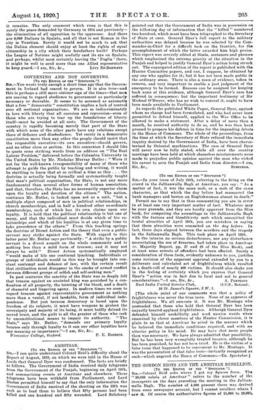[TO THE EDITOR OP THE " SPECTATOR."]
SIR,—In your issue of July 24th, referring to the firing on the crowd in the Jallianwalla Bagh at Amritsar, you say : " As a matter of fact, it was the same mob, or a mob of the same character, as that which the day before had massacred the bank managers and beaten an Englishwoman almost to death."
Permit me to say that in thus commenting you are in error in at least one very important matter of fact. Whatever may be your grounds, and they are hardly apparent from the Blue book, for comparing the assemblage in the Jallianwalla Bagh with the furious and bloodthirsty mob which committed the brutal atrocities of April 10th, you are mistaken in saying that these atrocities were commited on the day before. In fact, three days elapsed between the murders and the tragedy in the Jallianwalla Bagh. This took place on April 13th.
In the interim no serious disturbances, nor any disturbance necessitating the use of firearms, had taken place in Amritsar (v. Majority Report, pp. 27 and 28 of the Blue Book), and at least some arrests of offenders had been effected. Surely a consideration of these facts, evidently unknown to you, justifies some revision of the apparent approval extended by you to a deliberate and calculated act of frightfulness which resulted in a death-roll of nearly 400 victims. It should also shake you in the feeling of certainty which you express that General Dyer's "action was in fact due to local and not to general considerations."—I am, Sir, &c., A. Poremous East India United Service Club, (LC.S., Retired). 16 St. James's Square, S.W. 1.
[The whole point of our comments was that a policy of frightfulness was never the true issue. None of us approves of frightfulness. We all execrate it. It was Mr. Montagu who pretended that those who hold that General Dyer has been unjustly treated applaud frightfulness. Although General Dyer defended himself unskilfully and used unwise words when examined by clever members of the Hunter Commission, it is plain to us that at Amritsar he acted in the manner which he believed the immediate conditions required, and with no ulterior policy in his mind. He may have shot more people than was necessary. We have always admitted that possibility. But he has been very wrongfully treated because, although he has been punished, he has not been tried. He is the victim of a false issue that happened to he convenient to Mr. Montagu. It was the presentation of that false issue—instantly recognized as such—which angered the House of Commons.—En. Spectator.]


































 Previous page
Previous page